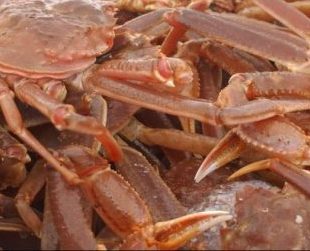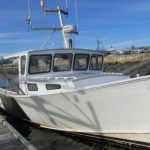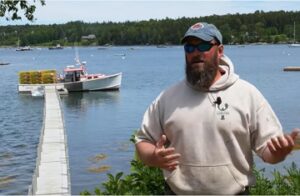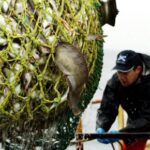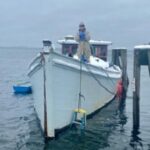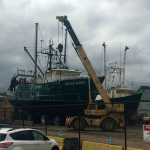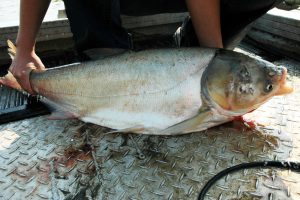Tag Archives: Derek Butler
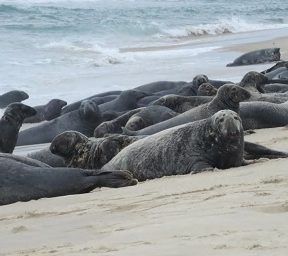
Federal Government Hosting Seal Summit in St. John’s
The federal government is hosting a Seal Summit in St. John’s this week to discuss product development and market innovation with various stakeholders. Seal populations off the coast of Newfoundland and Labrador have exploded with many in the fishing industry pointing to seal predation as one of the factors hindering cod recovery. As of last week, the location of the two-day summit still had not been released to media. >click to read< 12:08
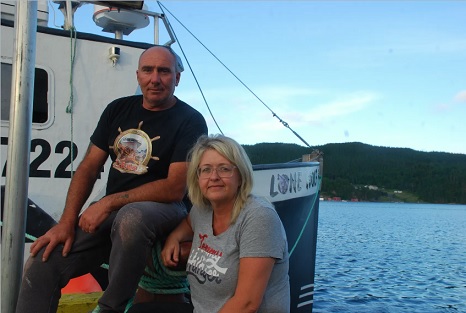
Multi-million dollar capelin fishery is a bust for eastern Newfoundland
The Lone Wolf is lying idle at the wharf in Hickman’s Harbour, Trinity Bay. The only sound is the lap of water against hull, the occasional screech of sea gulls flying past, hunting for food. Earlier this year the Department of Fisheries and Oceans (DFO) set a quota of around 15,000 metric tonnes for fishing zones from the south coast (area 3Ps) to the North East coast (2J, 3K and 3L zones). Inshore licenses, like the one the Marshes have, grant them just 12,000 pounds of crab. “This year we landed $82,000 worth,” she said. And that’s not a whole lot of money to pay a crew and cover the expenses of running a boat. “Last year I could fuel up my boat for $800,” she noted. “This year it costs $1600.” Capelin could have added another $30-40,000 to their seasonal revenue, making it the second most important fishery for their enterprise. But they’re not fishing it. Why not? It’s complicated. >click to read< 11:05
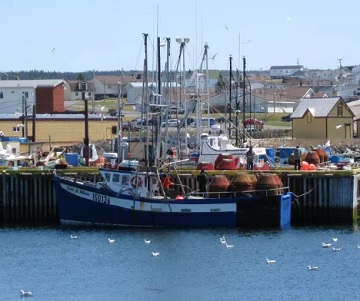
We’re not going anywhere — FFAW
According to Mr. Butler, fish harvesters in Newfoundland and Labrador are living like kings and queens while the poor processing companies struggle to balance the books. It’s a tale that’s been spun by Butler and his cronies with the Association of Seafood Producers since the onset of the COVID-19 pandemic. Ah yes, Derek Butler, champion of corporate profits, knows much about the rich shrimp harvesters of the Northern Peninsula (who, by the way, have no access to crab). They haven’t been able to sell their shrimp for enough to make ends meet, while the same companies buy the exact same product for over 50 per cent more at their facilities in Quebec. >click to read< 07:44

The fishery is worth more than ever. If the fisheries were meant to save rural N.L., what gives?
It’s 2022. It’s hard to believe, for a number of reasons. Time is flying by, and things inevitably change. But for the cod fishery in Newfoundland and Labrador, and in too many ways for the fishery generally, “plus ça change, plus c’est la même chose,” or, the more things change, they more they stay the same. We are 30 years out from the initial groundfish moratorium of July 1992. As we reflect, there are reasons to be grateful. By Derek Butler >click to read< 07:42
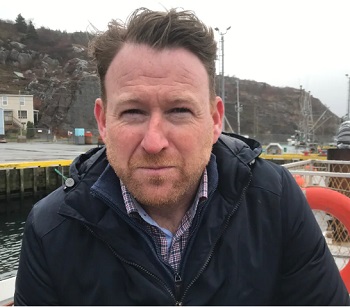
Snow crab producers could limit production to help international market
An excess of snow crab produced in Newfoundland and Labrador is leading to supply outpacing demand, leaving industry figures to question if it’s worth slowing production to allow the market to catch up. More than 60 per cent of the total quota has already been caught and processed, according to Derek Butler, executive director of the Association of Seafood Producers. Butler says the fast-paced production has caused the market for crab to stall, leaving the industry to wonder where it will go next. “It’s a situation where we continue to buy, produce and to build inventories without the required sales to support those inventories,” >click to read< 10:47
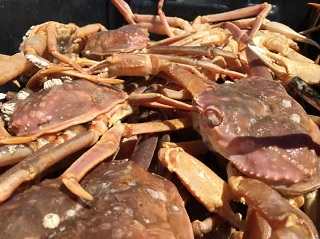
Snow crab producers compelled to respond to 2022 market challenges
The Association of Seafood Producers (ASP), representing the majority of Newfoundland and Labrador based snow crab producers, issued a media release today, saying the industry is compelled to respond to the 2022 market uncertainty. ASP says it has serious concerns that the snow crab market is not functioning in a normal manner, and that US and Japanese buyers have been reluctant to place orders for snow crab or have slowed their crab purchases week after week in the hopes of finding the bottom of the market. Newfoundland and Labrador have to date landed and produced over 60% of the crab, well ahead of previous years given this year’s quota increase. >click to read< 09:34
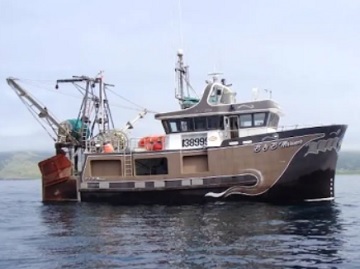
Slashed shrimp quotas cause worries for Newfoundland and Labrador captains
A couple weeks ago Brad Genge made a million-dollar bet on the future of shrimp. He bought another shrimp licence. Now he can only hope it pays off. Genge has been fishing out of Flower’s Cove, a community on Newfoundland’s Great Northern Peninsula, with his father Ren for about three decades. This is the 16th season for their longliner, B and B Mariner. And when another captain decided to retire and sell his enterprise, Genge saw it  as a chance to grow his own. These days the only way to get more shrimp quota is to buy it from someone willing to sell. Genge has invested heavily to secure three shrimp quotas in the Gulf, in an area near Port aux Choix, and four in the northern zone, off St. Anthony. It comes with risk, considering the shrimp biomass and the quotas have been declining. >click to read< 15:15
as a chance to grow his own. These days the only way to get more shrimp quota is to buy it from someone willing to sell. Genge has invested heavily to secure three shrimp quotas in the Gulf, in an area near Port aux Choix, and four in the northern zone, off St. Anthony. It comes with risk, considering the shrimp biomass and the quotas have been declining. >click to read< 15:15
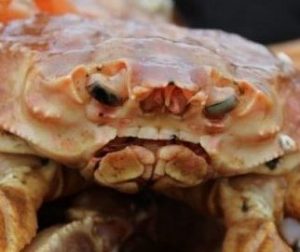
SEA-NL calls for Derek Butler’s resignation from Association of Seafood Producers
Seaward Enterprises Association of Newfoundland and Labrador, representing owner-operators in the inshore fleet, is calling for the resignation of the executive director of the association representing buyers/processors after publicly criticizing the province’s snow crab resource. “Derek Butler said on NTV News Tuesday that our snow crab is second-rate compared to product from the Maritimes, worth 30% less,” says Ryan Cleary, SEA-NL’s Executive Director. “For the spokesman for seafood companies in this province to say that publicly shows poor judgement and reflects poorly on what is the best snow crab in the world. He must no longer speak for industry.” >click to read< 13:36

Hundreds of Newfoundland fishermen protest prices, pressing minister for changes
Fishermen from across the Avalon Peninsula took their complaints and concerns about pricing for this year’s inshore fishery straight to Fisheries Minister Derrick Bragg in St. John’s on Monday, with a concurrent protest happening in Corner Brook. For fish harvesters like Conway Caines, the $12 per pound in Cape Breton this season is proof enough harvesters in Newfoundland and Labrador deserve more than last year’s $7.60 a pound. The Port Saunders man said he managed to get by in 2021 but said that price isn’t good enough given the higher cost of living this season. “I ain’t got no big quotas. I got enough to pay me instalments, feed me family and try to give me crew a decent share.” >click to read< 08:45
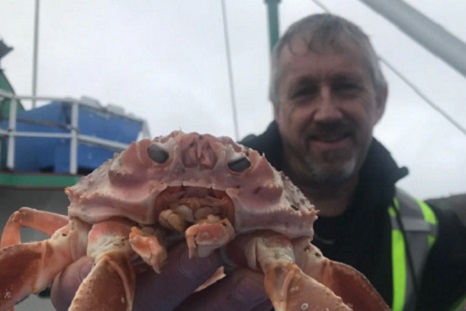
Record crab and lobster prices drive value of N.L. landings past billion-dollar mark
“It was remarkable,” Doyle says, referring to the $7.60 per pound, more than double last year’s price, Doyle and his son Thomas received for the roughly 16,000 pounds of snow crab they landed with their under-40-foot vessel, Tango Delta, this year. “In regard to prices, it’s better than I’ve ever seen it,” adds Doyle, adding that they also received record prices for their lobster landings. It’s not hard to hear upbeat language like that when talking to Newfoundland and Labrador fish harvesters this year, because their bank accounts were likely swollen by incomes of 40 to 50 per cent higher than past years. >click to read< 09:33
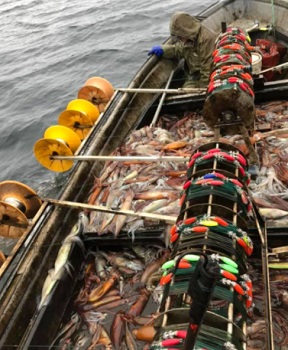
The Squid Tsunami in Newfoundland
Thousands of pounds of the tentacled invertebrate are so plentiful this year they’ve been washing up on beaches around the island of Newfoundland. In fact, the amount of squid landed this year will likely double last year’s landings, according to Derek Butler.,, “It’s huge landings this year and it’s more than we need, to be quite blunt,” he said, adding squid landings have also been good in Argentina, which also supplies the bait market. Some Newfoundland processors have already stopped buying. >click to read< 10:47

Water content deductions keeping harvesters sitting out the summers sea cucumber fishery
Sea cucumbers represent a $10-million industry in Newfoundland and Labrador, according to Fish Food & Allied Workers president Keith Sullivan. The creatures are a delicacy in Asian countries and other markets, and fetch a price of 70 cents per pound, according to the province’s fishery pricing panel. When catches are landed, processors drain the water inside sea cucumbers to remove the weight of the sea water from the buying price. 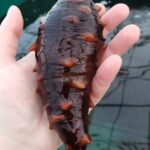 Harvesters used to deduct 23 per cent of the sea cucumber’s weight across the board to account for the water, but that percentage has been changed in the past year, and Sullivan says the harvesters’ bottom lines are being impacted. “Whereas other years you might be getting paid for 80 per cent or close to that of the animal, this year in a couple of cases we’re talking just over 50 per cent,” >click to read< 11:43
Harvesters used to deduct 23 per cent of the sea cucumber’s weight across the board to account for the water, but that percentage has been changed in the past year, and Sullivan says the harvesters’ bottom lines are being impacted. “Whereas other years you might be getting paid for 80 per cent or close to that of the animal, this year in a couple of cases we’re talking just over 50 per cent,” >click to read< 11:43
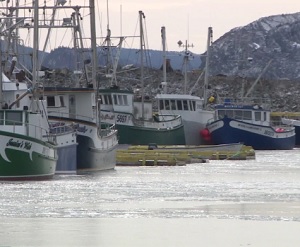
Shrimp fishery set to begin with financial loss – could be larger if boats stay at the wharf
Association of Seafood Producers president Derek Butler said the start of the fishery has been driven by a sense of responsibility among everyone that relies on the fishery to make a living. Butler said those involved in the fishery had time to decide whether or not they wanted to open, and understand this season will bring almost guaranteed financial loss. The Fish, Food and Allied Workers’ original price offer was $1.18 per pound, while processors countered with 70 cents per pound. In the end, a hearing settled on $1.08, but the ASP said that number still means losses for processors. However, Butler said the losses could be larger if boats don’t leave the wharf this season. >click to read< 16:52
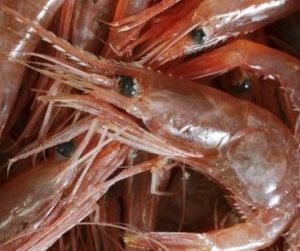
Newfoundland shrimp fishermen still in limbo as fish plants remain idle
Normally, the shrimp fishing season starts by June, with fishers in this area wrapping up their season in late August and hoping not to have to fish through the bad weather months of mid to late fall. But a wrangle over shrimp prices has lasted longer than usual, thanks in part to the uncertain markets caused by Coronavirus. In mid June the province’s Price Setting Panel decided on a price of $1.18 per pound, choosing the price suggested by the Fish Food and Allied Workers (FFAW-Unifor) over the price of .70 cents per pound suggested by the Association of Seafood Processors (ASP). Meanwhile, according to the union, shrimp processors in New Brunswick and Quebec, including a Royal Greenland-owned plant, have been buying shrimp from harvesters in that province while refusing to purchase from Newfoundland and Labrador harvesters. >click to read< 07:37
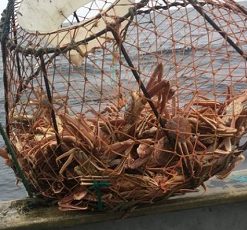
FFAW, processors remain at odds on opening Newfoundland and Labrador crab season
It remains to be seen whether harvesters in the province will eventually start fishing for crab and offloading it at plants for processing. According to the Fish, Food and Allied Workers (FFAW-Unifor), two vessels from outside the province were turned away in Port Aux Basques and denied the opportunity to offload crab as of Monday morning, and three transport trucks carrying crab harvested outside the province were being blocked from making deliveries to fish plants, two in South Brook and one at Goobies. “The fishery was postponed three times on health and safety issues,” Pretty said. “During that time, the bargaining for the price of crab should have progressed, but instead of progressing,,, >click to read< 19:46

Coronavirus: Fishermen block out-of-province crab shipments heading for N.L. fish plants
It’s the latest development in an argument with the Association for Seafood Producers over whether or not the fishery should be up and running during the COVID-19 pandemic. The Fish, Food and Allied Workers union (FFAW) says its members do not want to go to work on boats or in plants until their safety is assured. “Fish harvesters are mobilizing around the province to block out-of-province crab from landing in Newfoundland and Labrador for processing,” said a statement sent by the FFAW on Sunday night. “Harvesters and plant workers are calling on the provincial government to step in and for companies to respect N.L. workers.” >click to read< 07:40
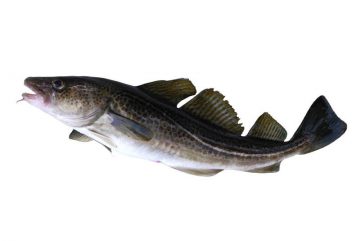
Fish or cut bait
Derek Butler of the Association of Seafood Producers says he was trying to make a point when he argued for an end to the recreational cod fishery. The point he was making is that the recreational fishery is by and large unregulated: there’s no clear picture about who is taking fish, where they are taking it and how much cod is actually landed. Shine a light by saying close the fishery, and get more eyes looking at the problem. His call for a ban may have generated plenty of heat, but we’ll take the bait. What Butler is raising is a question that bears closer analysis. >click to read<20:14

Northern cod stock declined over last year; scientists urge minimum fishing effort
Those in the province’s fishing industry hoping the northern cod would be ready for a commercial fishery in a few years’ time — a saviour to an industry suffering repeated blows from declining crab and shrimp stocks — better hold on to their hooks and nets. Northern cod this year are in the same leaky boat, having declined significantly over the past year. And that has come as a surprise to many because the northern cod stocks off the province’s east and northeast coast showed promising growth since 2012 — the first real glint of light since the dark and uncertain days of the northern cod stock collapse of the late 1980s and early 1990s. >click to read<10:10






